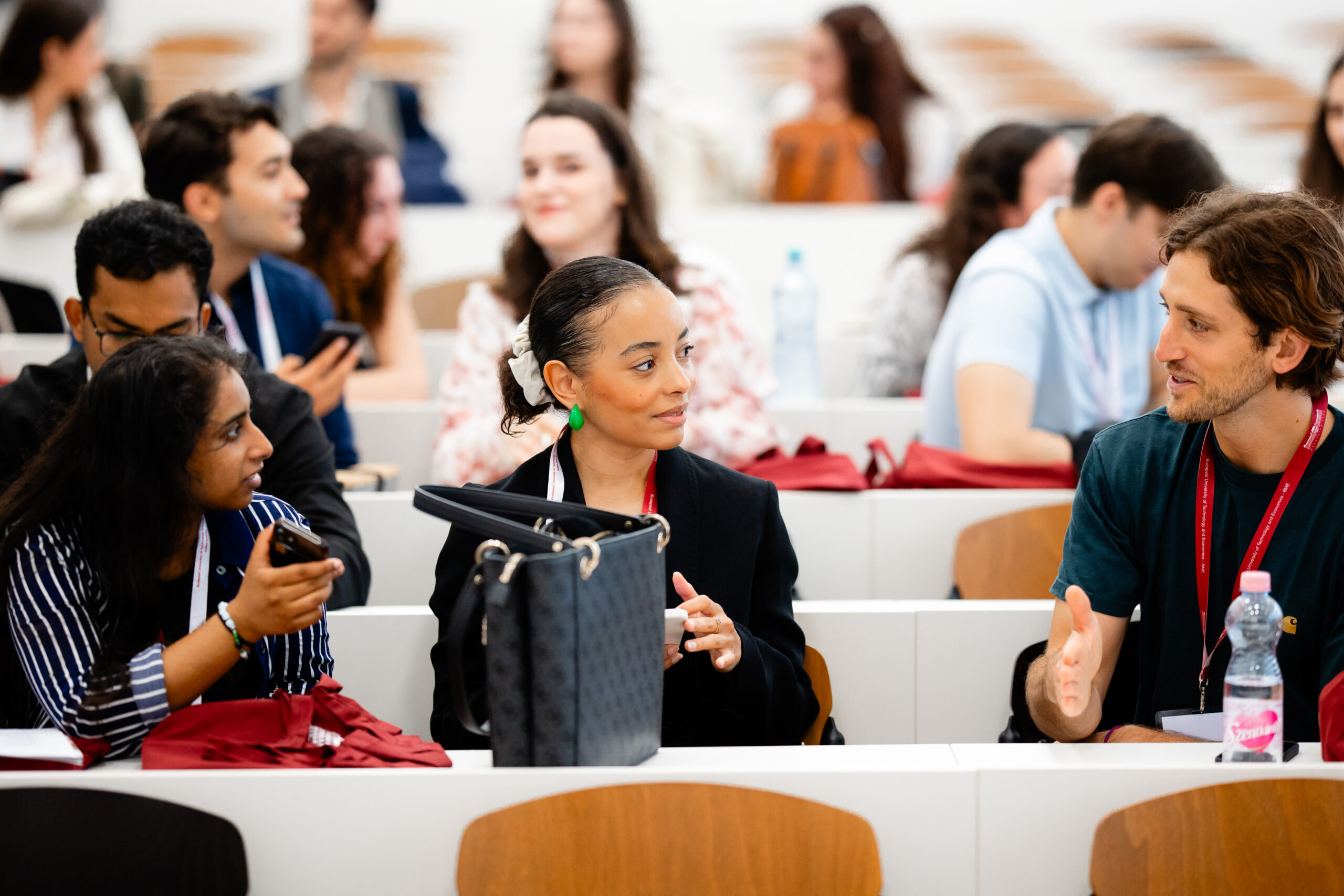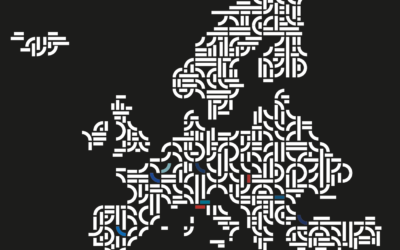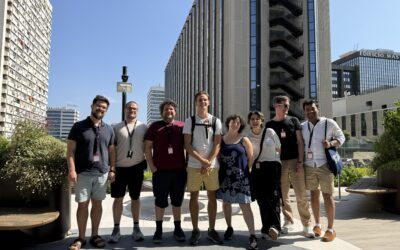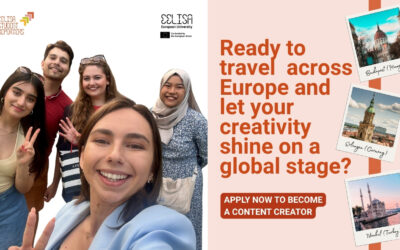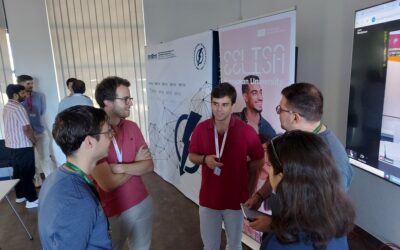The second event of the initiative was successfully held in Budapest, after an unexpected and sudden change of venue.
„Fifty years ago, me and five of my companions took part in the Hungarian equivalent of this competition, called TDK. We didn’t win anything, and this decision was not unfair. It was just wrong'” – with this joke Professor András Pataricza, co-chair of the organising committee, opened the awards ceremony of the EELISA Student Scientific Competition held in Budapest. It is no coincidence that he began his speech by mentioning the long-standing TDK – the initiators of the international event should aspire to achieve similar success.
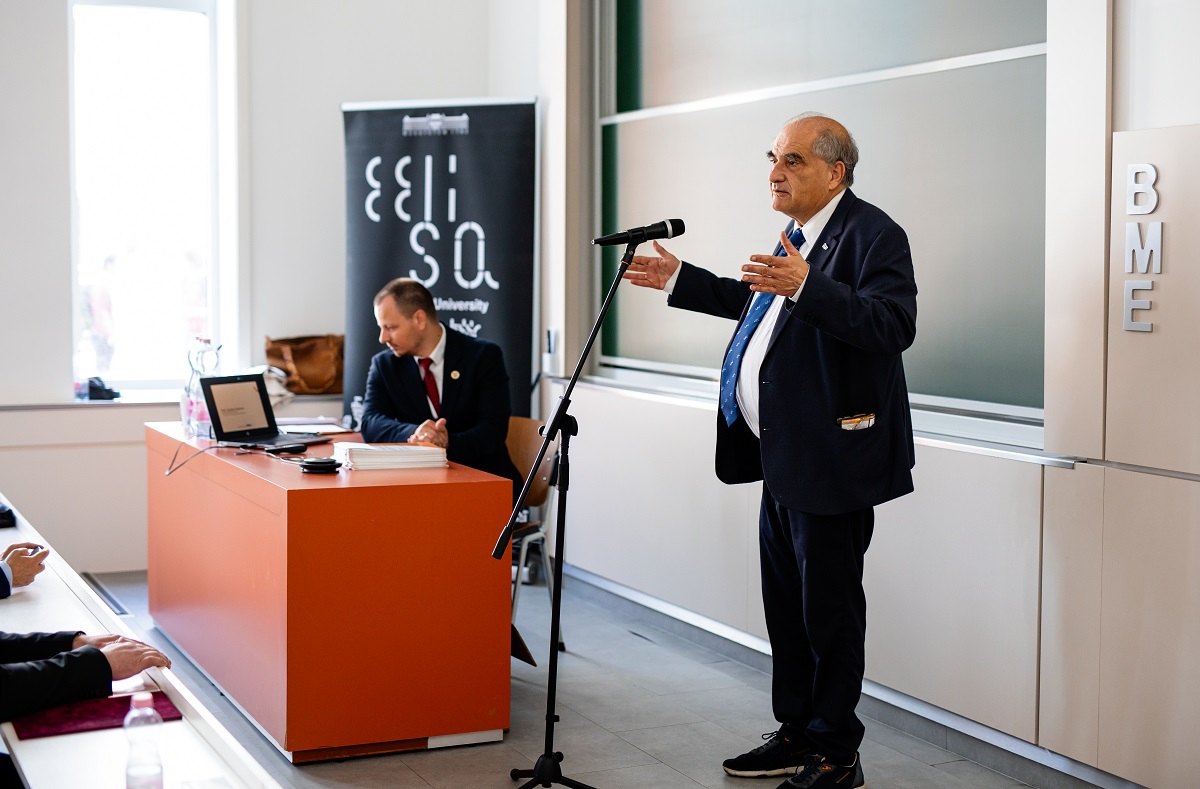
András Pataricza
The echo of the second EELISA SSC, now organised by the initiator, Budapest University of Technology and Economics (BME), suggests that it has a good chance of becoming a tradition. Not only because, compared to the first competition in Pisa, Italy, almost twice as many entries – more than 140 – were found by the pre-screening experts worthy of judging. Not least because, at the awards ceremony, EELISA President Dale A. Martin expressed his satisfaction with the quality of the research presented. But also because it is clear that a competition based on the Hungarian TDK has a place and a function in this community.
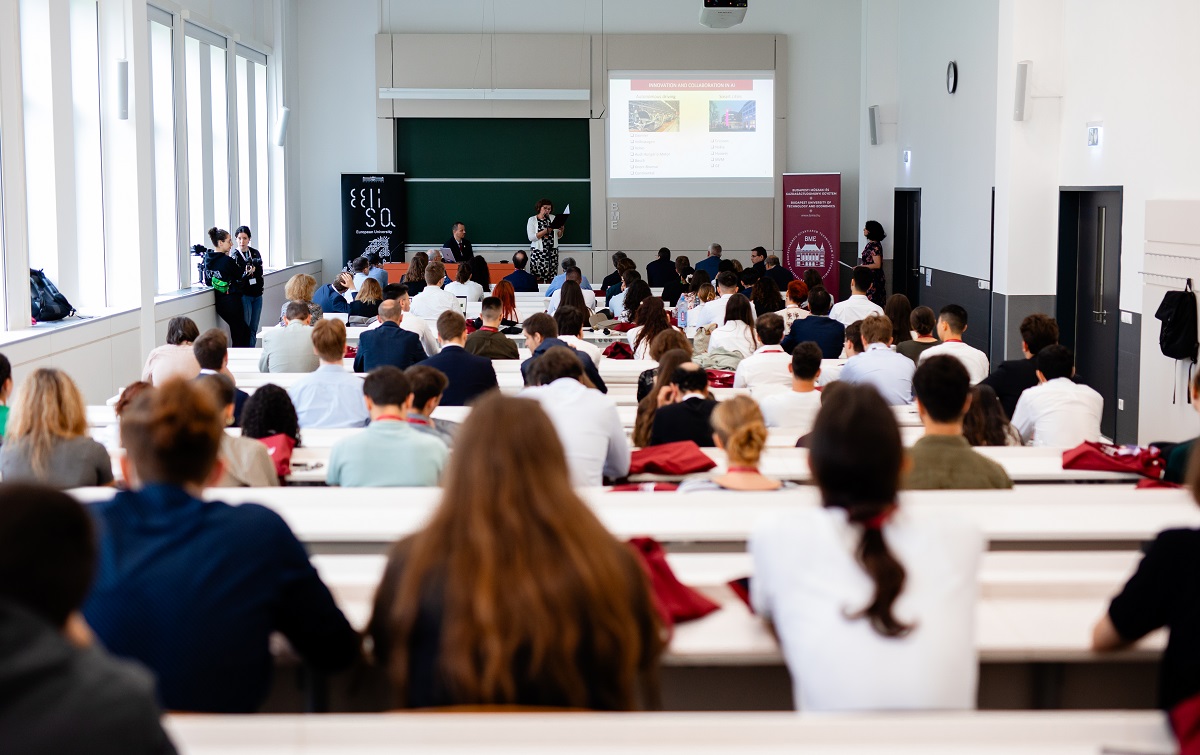
This is what András Pataricza said when asked to briefly assess the experience of the event, notoriously moved to the Infopark Q building at the last minute due to the temporary closure of the central building of BME.
„There’s a saying in Hungary, ‘TDK is eternal’, and it’s true, this is something loved and appreciated by everyone for over 70 years, regardless of regimes and governments. It carries a value that is unique in the whole of Europe and the current initiative is a first attempt to internationalise it. There are still differences, of course, as the long-established requirements for TDK cannot all be applied yet, with different countries having different practices. There were, for example, some papers that were really valuable from an engineering point of view and would certainly have won a prize in an innovation competition, but scientifically were not outstanding,” the professor said.
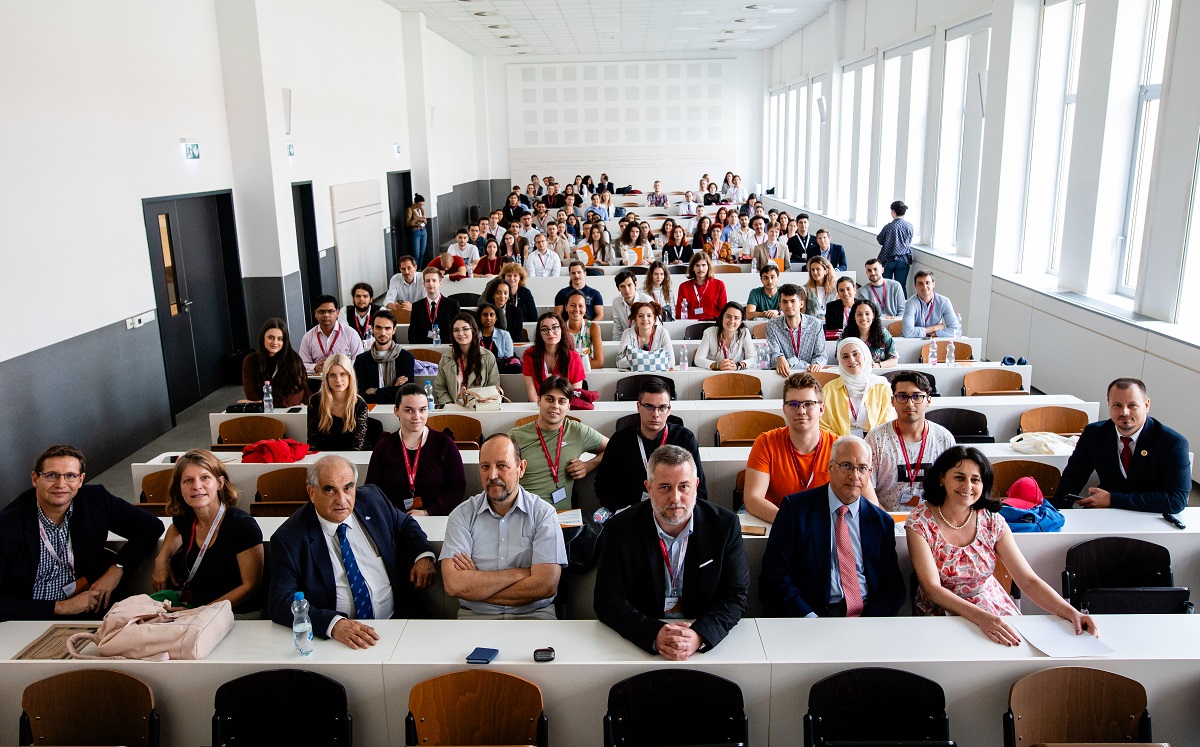
Overall, he said, it turned out that there were lots of equally good works coming from the international EELISA partners and they could be integrated in a natural way. There was a fairly even balance in the quality and even in the list of institutions of award winning students, although there was no sign of deliberate balancing in the judging. „And it is also important for our university that these foreign students went home having been shown the BME, Budapest and the technical culture of Hungary. Just as the performance of our own students is the best advertisement for our university, the foreign students will carry our good reputation,” he added.
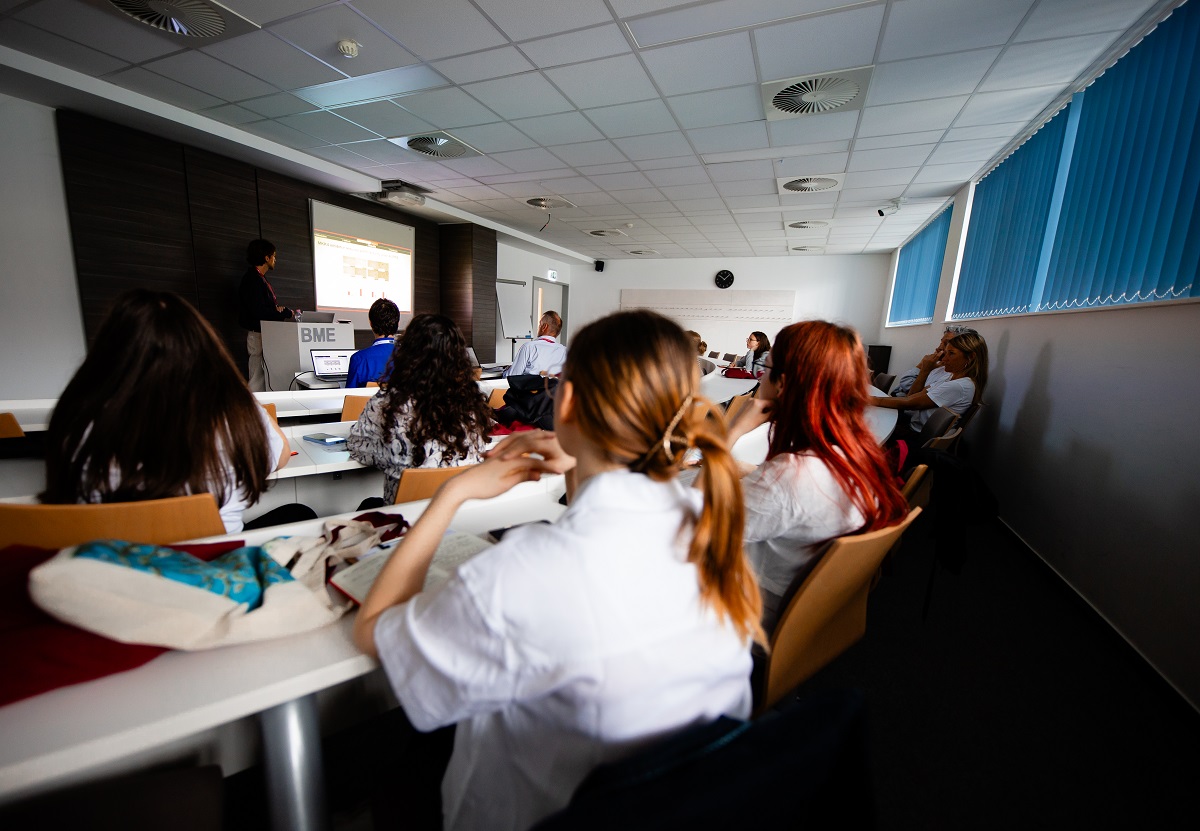
After the closing ceremony, we spoke to some of the participants who had achieved first place. Jacob González Isa, a graduate student at the Universidad Politécnica de Madrid (UPM), won the award for his work entitled Detection of metagenomic functional enzyme variants of biotechnological and ecological interest through phylogenomics, and is determined to continue his research at the University of Cambridge, where he will be doing his PhD. „I’m studying bioinformatics, so I don’t have a pure engineering background, but a competition like this is a great opportunity to gain an engineering network. In the field of bioinformatics, computational biology, you need engineering as well,” he told bme.hu.
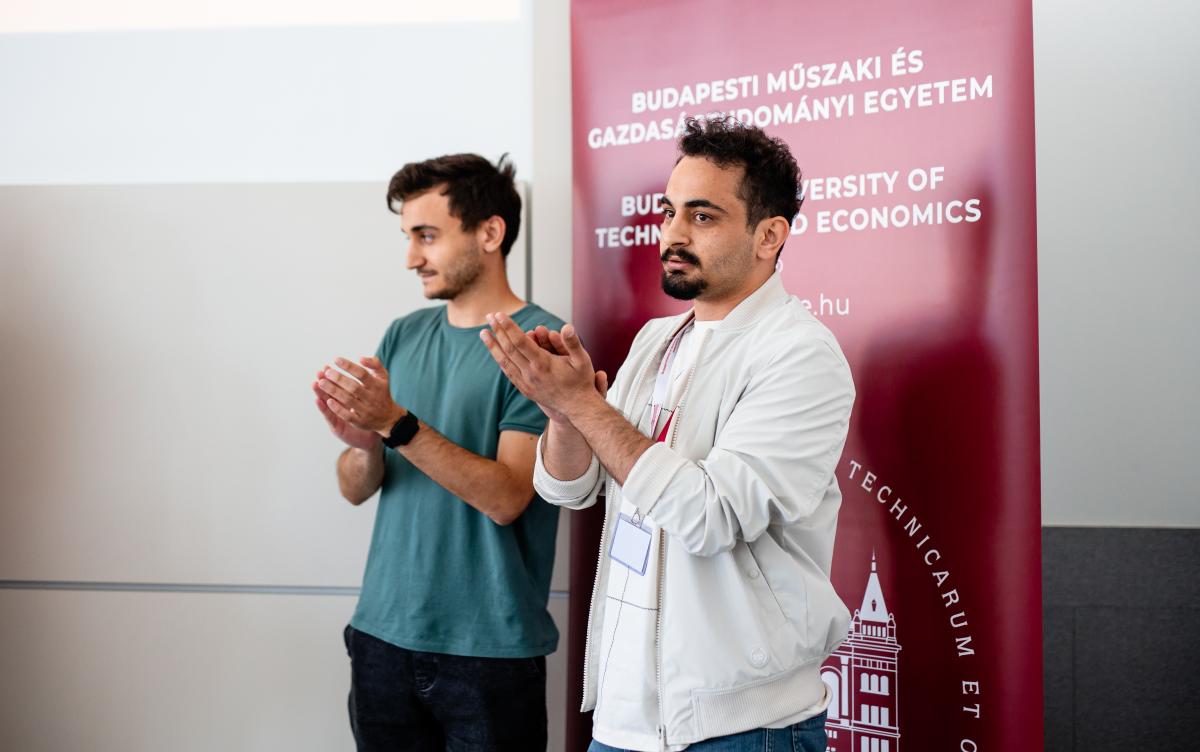
Jacob praised the university, saying its modern buildings were reminiscent of an American institution. Asked if he would change anything about the way the competition was run, he said that some of the sections were perhaps too eclectic, although acknowledged that this could also be seen as a positive – „after all, it’s good to step out of your comfort zone trying to deliver a speech to people who are not experts in your actual field”.
Miguel Urena Pliego, also from UPM, was awarded first prize for his work entitled Machine learning models for urban analysis: Historical evolution of the surface destined for cars in Vienna and Madrid. He had already visited Budapest before, on a weekend trip during his Erasmus scholarship in Vienna, but this was his first visit to the BME. He said he was very impressed by the local students and teachers he met, and developed good relationships with many of them. And he also has big plans with his research. ” I’m working for a department at my university and we have a startup to use the results of out research. The idea is to create a product combining artificial intelligence and satellite imagery that we can then launch on the market,” Miguel explained. As for the event origanisation, he suggested that the presentations could use a little more time. „But what is that compared to the fact that everything had to be reorganised due of the high water of the river Danube, and we didn’t perceive any of that?” he added with a laugh.
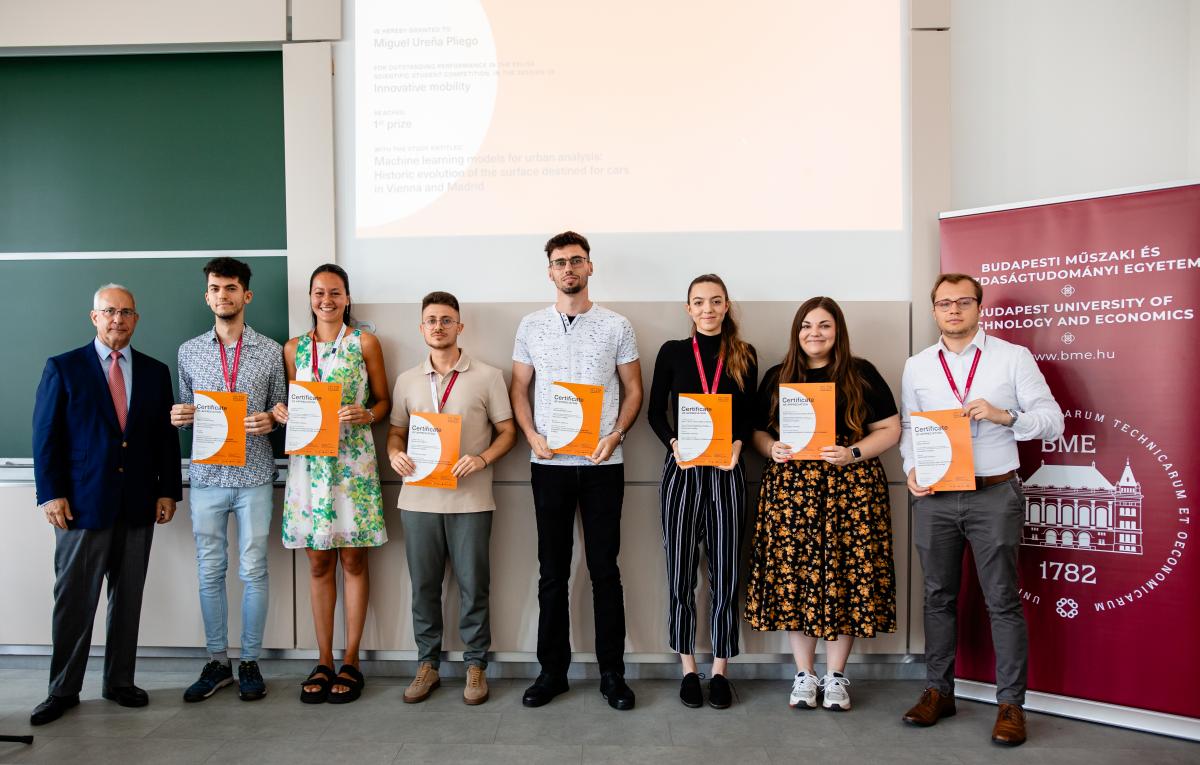
Nuofan Gao, having moved to Europe four years ago from Shanghai, is now a student at last year’s host, Scuola Superiore Sant’Anna (SSSA) in Pisa. His work is entitled Exploring the Success Factors of MetaApp: A Case Study of China’s Metaverse Industry. He started by saying that the city was almost familiar to him, as it reminded him very much of Milan, Italy. However, the BME is huge compared to the SSSA, „almost the size of a Chinese university”, and it is very impressive that a small part of the city is occupied by solely the campus. He said that the K building is particularly impressive, at first he thought it was the parliament building. He noted that the art exhibition in the lobby of building Q was astonishing. „It’s quite strange when you first enter the university building and see all these things moving around without any control,” he added. (Please read about the exhibition here.)
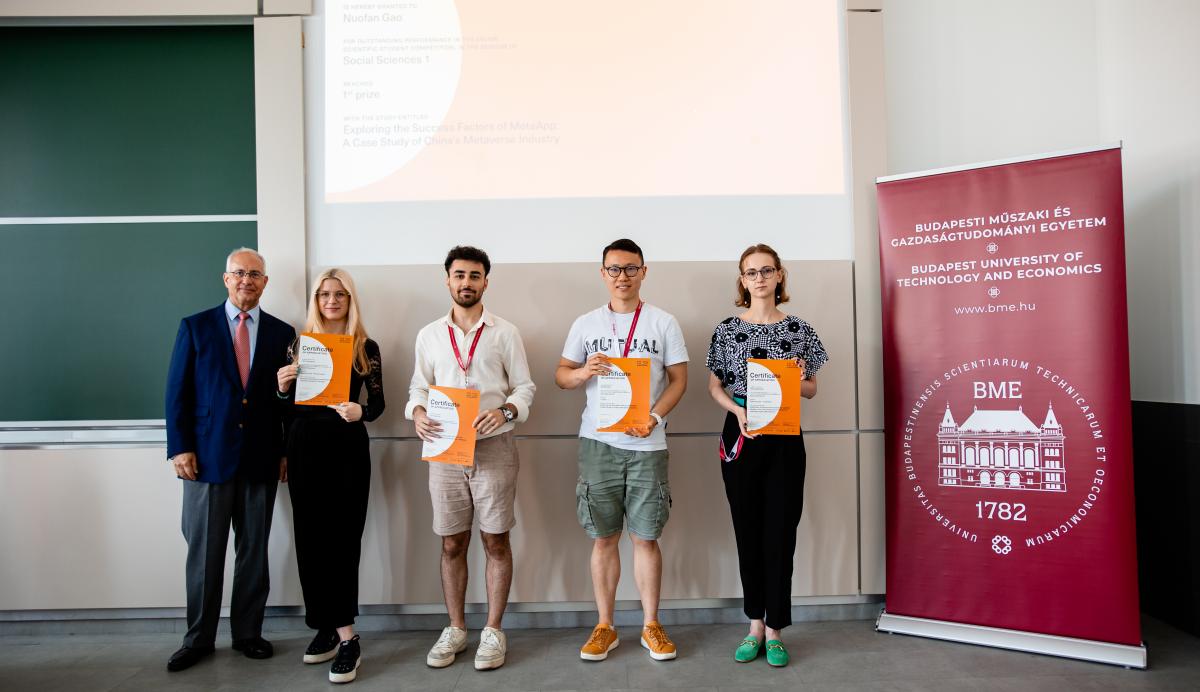
He summed up the subject of his research by saying that the metaverse industry in China is the opposite of what companies like Meta and Microsoft are following. „In America, the big technnology companies are using sophisticated equipment to produce high-quality metaverse images, but this makes the service unaccessibly for most users because of the equipment being expensive. Tot he contrary, the version popular in China sacrifices quality in exchange for more accessible content. It was implemented by a PhD student at Yao University, who then protected some interesting patents and set up his own company. It’s an inspiring story for me too, because I used to think that PhD students were just supposed to go on an academic career path and eventually become professors.”
Csenge Dremák graduated as a mechanical engineer and is now studying environmental engineering at BME. She says she would like to actively contribute to sustainability goals through her research. It is also related to this research (Production of wood-plastic composite using polyolefin and wood waste), dealing with the mechanical properties of wood-reinforced composite and the suitability of microplastics for recycling. The paper could become a thesis. „It was a good experience to present in English in front of an international audience, talking to foreign students. I was especially happy to see other sustainability topics in my panel,” Csenge said.
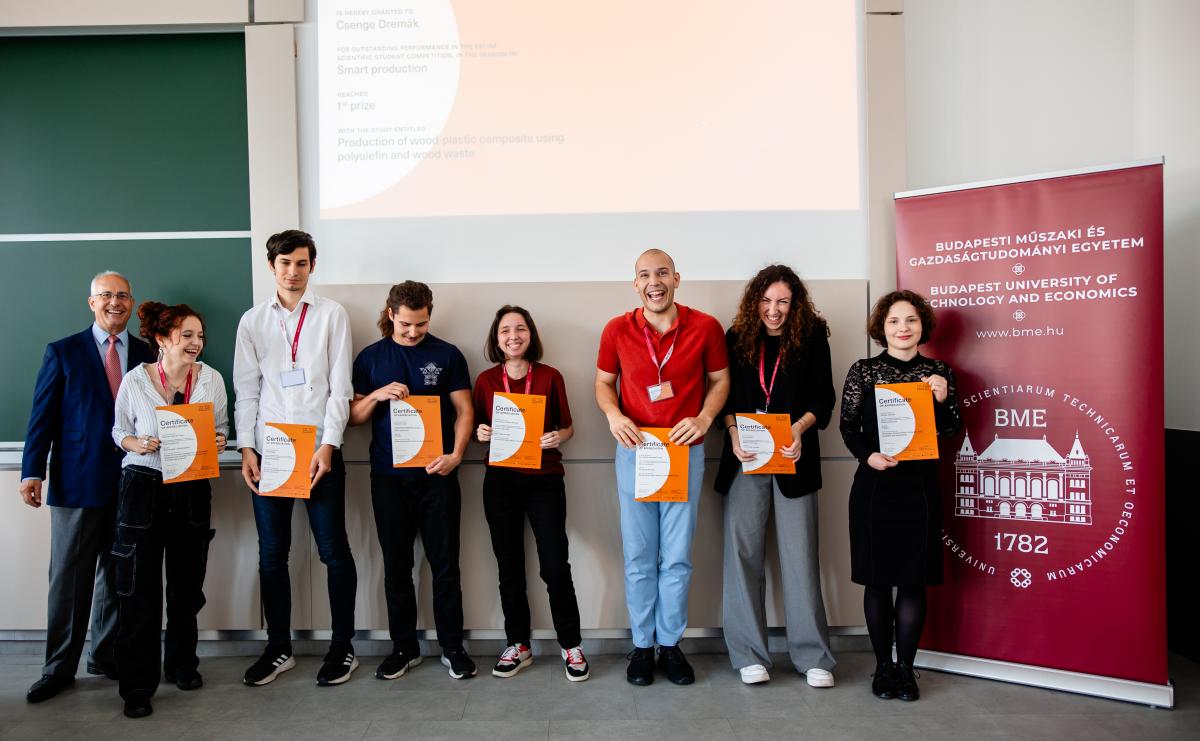
She added that she likes being in an international environment, trying herself in new situations, and got the impression that the visitors were very open-minded. Several people asked after her presentation, so it seems „this event is very good for networking as well”. For this reason, she would like to see more forums where students can exchange ideas about their research. Though all the informal programmes are good, she would still like to have more discussions about professional issues.
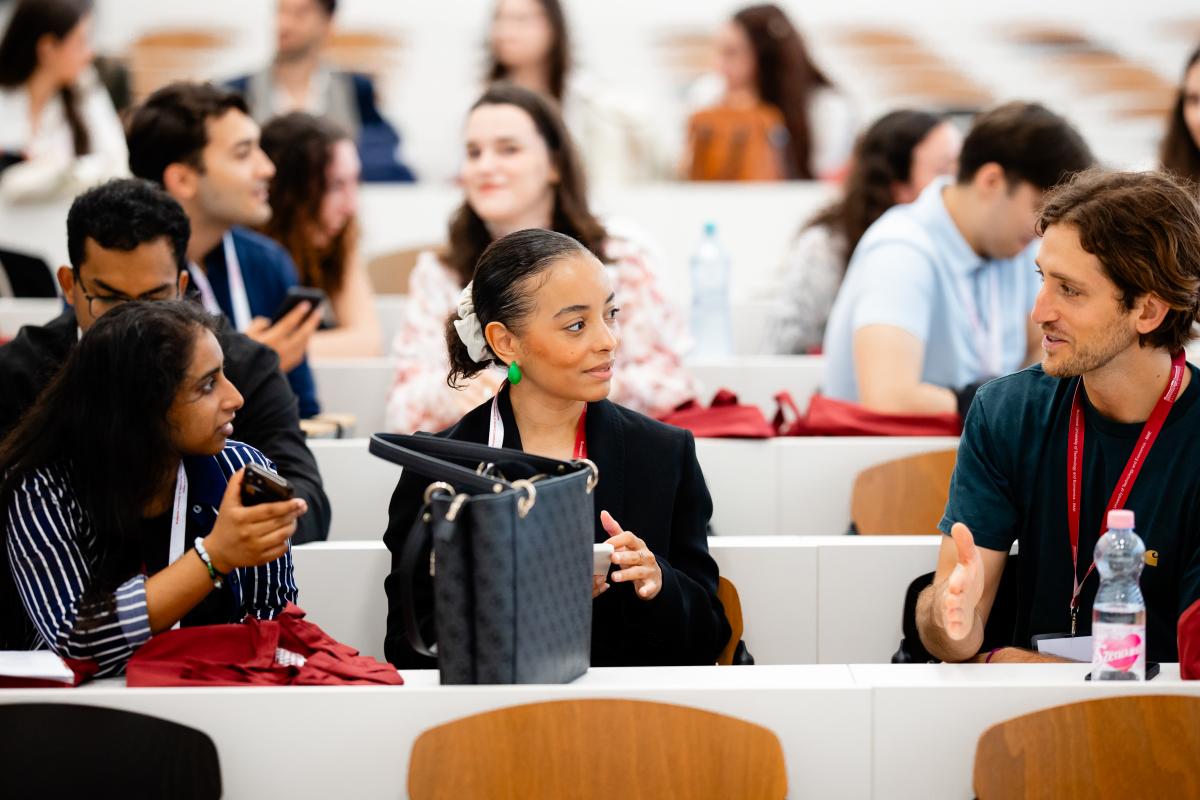
For András Pataricza, in addition to the work of the „fantastically enthusiastic teaching team and the equally committed organising team”, it was an experience to see how ecstatic the participants were at the awards ceremony, „something I have never experienced at a domestic TDK competition before”. The event has therefore proved its worth in every aspect and they are delighted to continue. No formal decision has been taken yet, it is up to the organising partners to decide, but „I would be very surprised if, after two such successful events, it was not supported by everyone.”
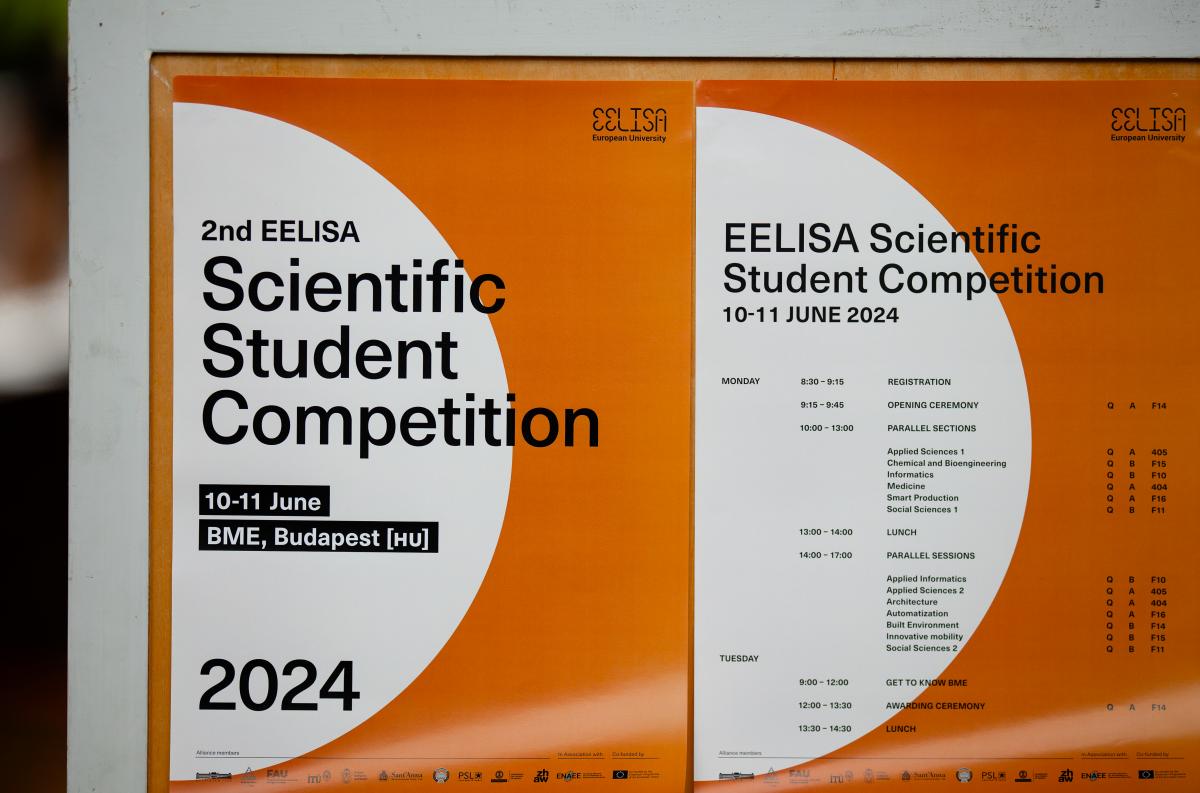
The prize winners:
| Social sciences 2 | ||
| 1st prize | Pawan Kumar | Budapest University of Technology and Economics (BME) |
| 2nd prize | Rosario Carretero Casado | Universidad Politécnica de Madrid (UPM) |
| 3rd prize | Alessandro Valfrè | Scuola Superiore Sant’Anna (SSSA) |
| Special prize – Interdisciplinary approach | Guillermo Cruz Pinto | UPM |
| Honorable mention | Awrin Rakshit | Friedrich-Alexander University Erlangen-Nürnberg |
| Honorable mention | Matteo Dalle Luche | SSSA |
| Honorable mention | Ciprian Negura | Universitatea Politehnica din București (UPB) |
| Honorable mention | Ana-Maria Marin, Georgiana Cretu, Radu-Marian Orită, Veronica Constantin | UPB |
| Social sciences 1 | ||
| 1st prize | Nuofan Gao | SSSA |
| 2nd prize | Leonardo Ricci | SSSA |
| Special prize – Innovation | Rita Ladjánszky | BME |
| Special prize – Social Impact | Lilla Harangozó | BME |
| Honorable mention | Ozan Demirel | Istanbul Teknik Üniversitesi (ITÜ) |
| Honorable mention | Ulysse Manhes | Université Paris Sciences & Lettres (PSL) |
| Honorable mention | Cristina-Mihaela Fleaca, Radu-Marian Bujdoiu, Radu-Marian Bujdoiu | UPB |
| Innovative mobilty | ||
| 1st prize | Miguel Ureña Pliego | UPM |
| 2nd prize | Rebeka Anna Jáger | BME |
| 3rd prize | Rubén Flores Gandur | UPM |
| Special prize – Young talents | Babiuc Daria, Victor Luncașu | UPB |
| Honorable mention | Gábor Jevuczó | BME |
| Honorable mention | Sofija Ilić | UPM |
| Honorable mention | George Daniel Enache | UPB |
| Honorable mention | Rares-Alexandru Niculescu | UPB |
| Honorable mention | Mircea-Dan Mirică | UPB |
| Honorable mention | Janka Tihanyi, Nóra Julianna Ráduly | BME |
| Smart production | ||
| 1st prize | Csenge Dremák | BME |
| 2nd prize | Radulovic Luka | BME |
| 3rd prize | Dániel Nagy | BME |
| Special prize – Sustainability | Marina Castro de Troya | UPM |
| Honorable mention | Jacobo Garrido Delgado | UPM |
| Honorable mention | Paul Cretu, Andreea Tanase | UPB |
| Honorable mention | Barnabás Piri | BME |
| Honorable mention | Laura Mailat | UPB |
| Automatization | ||
| 1st prize | Balázs Endrész | BME |
| 2nd prize | Zsanett Bertók | BME |
| 3rd prize | Miguel Grande Ráez | UPM |
| Special prize – Space detection | Bianka Forczek, Levente Ákos Ludvig | BME |
| Honorable mention | Iulian-Nicolae Petriia, Daniel-Ioan Mircu | UPB |
| Honorable mention | Cercel Dragos-Stefan, Dogaru Paul-Leonard, Hutart Mara-Ioana, Luca Dan-Andrei, Rusu Cosmin-Constantin | UPB |
| Honorable mention | László Gácsi | BME |
| Honorable mention | Ahmet Turan Akcay | ITÜ |
| Informatics | ||
| 1st prize | Nandor Kofarago | BME |
| 2nd prize | Ármin Zavada | BME |
| 3rd prize | Alvaro Garcia-Barragan | UPM |
| Special prize – Sports analytics | Balázs Márk Mihályi | BME |
| Special prize – Supporting mobility | Márk Czimber | BME |
| Honorable mention | Cătălin Chelmuș, Ionuț-Liviu Mogda, Gabriel-Alexandru Constantinescu, Andrei-George Nicola | UPB |
| Honorable mention | Ágoston Dalotti | BME |
| Honorable mention | Alberto González Calatayud | UPM |
| Honorable mention | Andrei Time, Sorin Ionescu, Diego Augusto de Jesus Pacheco | UPB |
| Applied informatics | ||
| 1st prize | Kristóf Floch | BME |
| 1st prize | Kata Dóra Vincze | BME |
| 3rd prize | Zoltán Simon | BME |
| Special prize – Next generation energy | Radu Cristian Opreanu | UPB |
| Special prize – Young talents | Márton Lukács Gellér | BME |
| Honorable mention | Ștefan-Matei Gheorghitá, Adrian-Ionuț David | UPB |
| Honorable mention | Benedek Zentai | BME |
| Honorable mention | Laurențiu-Alexandru Zaharia, Miruna-Elena Talmacel, Alex-Ionuț Marinescu | UPB |
| Honorable mention | Sorana-Eliza Baltaretu, Robert-Mihai Pivoda | UPB |
| Architecture | ||
| 1st prize | Eszter Nagyhegyesi | BME |
| 2nd prize | Nikolett Geraszin | BME |
| 2nd prize | Rand Sukkar | BME |
| Special prize – Scientific and practical contribution | Dorottya Lizer, Luca Szakonyi | BME |
| Honorable mention | Jing Zhang | UPM |
| Honorable mention | İrem Esen | ITÜ |
| Honorable mention | Nuh Erturk | UPB |
| Honorable mention | Nóra Hangodi | BME |
| Medicine | ||
| 1st prize | Ahmet Kaymak | SSSA |
| 1st prize | Lisabeth Emilius | SNS |
| 3rd prize | Linnea Evanson | PSL |
| Special prize – Clinical potential | Leandro Mancina | Zürcher Hochschule für Angewandte Wissenschaften (ZHAW) |
| Special prize – Elderly care | Alexa Diana Kalyanii | UPB |
| Honorable mention | Shannon Vlahakis | ZHAW |
| Honorable mention | Irene Pinilla Fernández | UPM |
| Honorable mention | Andra-Cristiana Maria-Fulasu, Ruxandra-Ioana Cipu, Ștefan-Cătălin Petrescu | UPB |
| Honorable mention | Mihaela-Cristina Strîmtoreanu | UPB |
| Applied sciences 1 | ||
| 1st prize | Jacob González Isa | UPM |
| 2nd prize | Mehmet Orhan Şirin | ITÜ |
| Special prize – Innovative modelling | Victoria-Elena Plopeanu | UPB |
| Special prize – Simulation-based design | Alfonso Lainez Muñiz | UPM |
| Honorable mention | Laura Pascal | UPB |
| Honorable mention | Bianca Hârseanu | UPB |
| Applied sciences 2 | ||
| 1st prize | István Andorfi | BME |
| 2nd prize | Donát Ákos Köller | BME |
| Special prize – Scientific impact | Bence Fitos | BME |
| Special prize – Scientific impact | Dan Maurel | PSL |
| Honorable mention | Alexandra-Maria Bors, Andrei-Robert Coman | UPB |
| Honorable mention | Israel López Moreno, Helena Uyá Ramírez | UPM |
| Chemical and bioengineering | ||
| 1st prize | Alessandro Pasqui | PSL |
| 2nd prize | Suvija Suthakaran | ZHAW |
| 3rd prize | Balázs Borbás | BME |
| Special prize – Best presentation | Adriana Recalde Garcete | UPM |
| Special prize – Innovation | Alin-Ionuț Alecu, Ana-Maria Albu, Celina Maria Damian, Andra Mihaela Onas, Cristina Stavarache, Roxana Truscá | UPB |
| Honorable mention | Enrique Algar Arévalo | UPM |
| Honorable mention | Cristian Radu | UPB |
| Honorable mention | David Hidalgo-Carvajal | UPM |
| Honorable mention | Paul Valentin Lovin, Ana-Maria Albu, Iulia Neblea, Ioana Cătălina Gifu, Bogdan Trica, Cristian Andy Nicolae | UPB |
| Built environment | ||
| 1st prize | Samuel Reyes Sanz | UPM |
| 2nd prize | Adél Olosz | BME |
| Special prize – Environmental Impact | Nerea Portillo Juan | UPM |
| Honorable mention | Alejandro José Terrones García | UPM |
| Honorable mention | Máté Álmos Szondi | BME |
| Honorable mention | Levente Szatmári | BME |
| Organizing Committee (all members by BME): Balázs Kövesdi (chairman), András Pataricza (co-chairman), Eszter Tóthné Mischl (secretary), Cecília Liszkay (secretary), László Gergely Vigh (EELISA coordinator), Brigitta Szilágyi, Máté Zöldy, Ágnes Urbin, Noémi Csigéné Nagypál, Patrik Gádoros, Dóra Máthé, Sándor Kiss, Csaba Fehér, Márk Kovács, Bálint Molnár, Boglárka Tóth, Enikő Buda, Zsuzsanna Jászai, Dóra Baranyai, Marianna Oros-Klementisz, András Horváth, Éva Kármán-Tamus, Márton Pluzsik, Attila Ficsor, Milán Mondok, Márton Virt, Réka Mándoki, Mihály Dobos Kovács, Bálint Kurucz, Kata Buda. |
PG

